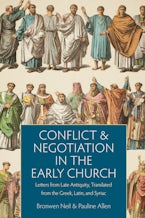Preparing your PDF for download...
There was a problem with your download, please contact the server administrator.
Conflict and Negotiation in the Early Church
Letters from Late Anquity, Translated from the Greek, Latin, and Syriac
by Bronwen Neil and Pauline Allen
Imprint: Catholic University of America Press
Recent decades have seen great progress made in scholarship towards understanding the major civic role played by bishops of the eastern and western churches of Late Antiquity. Brownen Neil and Pauline Allen explore and evaluate one aspect of this civic role, the negotiation of religious conflict.
Conflict and Negotiation in the Early Church focuses on the period 500 to 700 CE, one of the least documented periods in the history of the church, but also one of the most formative, whose conflicts resonate still in contemporary Christian communities, especially in the Middle East.
To uncover the hidden history of this period and its theological controversies, Neil and Allen have tapped a little known written source, the letters that were exchanged by bishops, emperors and other civic leaders of the sixth and seventh centuries. This was an era of crisis for the Byzantine empire, at war first with Persia, and then with the Arab forces united under the new faith of Islam. Official letters were used by the churches of Rome and Constantinople to pursue and defend their claims to universal and local authority, a constant source of conflict. As well as the east-west struggle, Christological disagreements with the Syrian church demanded increasing attention from the episcopal and imperial rulers in Constantinople, even as Rome set itself adrift and looked to the West for new allies.
From this troubled period, 1500 letters survive in Greek, Latin, and Syriac. With translations of a number of these, many rendered into English for the first time, Conflict and Negotiation in the Early Church examines the ways in which diplomatic relations between churches were developed, and in some cases hindered or even permanently ruptured, through letter-exchange at the end of Late Antiquity.
Brownen Neil is Professor of Ancient History, Macquarie University, Australia. Pauline Allen is Professor of Early Christian Studies, Australian Catholic University.
"I can think of no two scholars in the world who are more ably suited to analyze this episcopal correspondence than Pauline Allen and Bronwen Neil. Represents a major contribution to the fertile field of studies in the interrelation between imperial and ecclesiastical life in the late ancient (and ‘early Byzantine’) era."
~Paul Blowers, Emmanuel Christian Seminary at Milligan College
"At the heart of this exciting and unusually rich new volume are new translations of neglected letters from several crucial moments in the ‘ecumenical conflict’ of the late ancient church. The story begins with the fracturing of the Roman Empire in the fifth century, moves through the bifurcation of the eastern Church in the sixth, and ends in the crisis of the seventh, with the Islamic caliphate ascendant and the eastern Roman Empire in retreat. Each set of texts comes with an introduction drawn from the latest research, and the whole is framed with a critical reflection on epistolography and its role in creating, exacerbating, and alleviating conflict. Once again the authors have provided a wonderful service to the field."
~Philip Booth, Oxford University
"While the Roman Empire was falling apart politically in the sixth and seventh centuries, the Christian church struggled to maintain unity in the face of an unprecedented storm of religious conflict and social and cultural change. Bronwen Neil and Pauline Allen are expert guides to the ‘language of threats and promises’ that bishops, monks, and emperors used to pressure one another into compliance. The 41 letters they translate, culled from some 1,500 written during these years, will be eye-opening for most beginning (and even advanced) students of early Christianity."
~Harold Drake, University of California Santa Barbara
" Conflict and Negotiation in the Early Church offers a window into the dynamic process through which the great Christian centers of the late antique world struggled with one another to assert authority beyond their home regions. By paying particular attention to the letters sent between bishops, emperors, and imperial administrators, Neil and Allen reconstruct the exchanges that made the late antique Roman Christian oikoumene function and trace those that tried to make sense of its seventh-century breakdown. What emerges is a compelling new history of the late antique church--and a new way to think about the history of the early medieval Mediterranean."
~Edward Watts, University of California San Diego
"This handsome volume presents over forty episcopal letters, many translated into English for the first time, from the twilight years of the eastern Roman Empire. Neil and Allen are to be commended for having marshalled the material so carefully, and for their lucid introductions to each tranche of correspondence… Conflict and Negotiation in the Early Church makes a valuable contribution to the study of this period, and, in opening up such rich sources to a wider readership, has performed a very great service."
~Journal of Ecclesiastical History
"Neil and Allen offer a pointed, insightful introduction to an age of conflict that involved churches across the Mediterranean World. Their selection of translated texts will make the rhetoric and strategies of negotiation from this time more accessible. This volume makes a compelling case for the relevance of letters as sources that reveal the contours of religious conflict in late antiquity."
~Journal of Eastern Christian Studies

